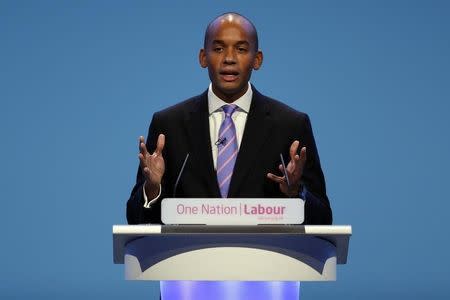Labour took wrong path and must return to centre, grandees say
By Estelle Shirbon LONDON (Reuters) - The Labour Party must return to the political centre ground and acknowledge the aspirations of millions of voters it ignored in its election campaign, senior figures said on Sunday, as the party's crushing defeat hit home. The Conservatives, who during their five years in coalition with the Liberal Democrats imposed huge public spending cuts, won a surprise overall majority of 331 seats in parliament and are now forming a single-party government. Labour leader Ed Miliband, widely seen as having steered the party leftwards from former Prime Minister Tony Blair's centrist "New Labour", resigned on Friday after the party won just 232 seats. Blair, who won three elections in a row to be prime minister from 1997 to 2007, wrote in The Observer newspaper that Labour should be more inclusive and aspirational -- comments echoed by one of the frontrunners to replace Miliband, Chuka Umunna. "The route to the summit lies through the centre ground. Labour has to be for ambition and aspiration as well as compassion and care," Blair wrote. "Hard-working families ... want to know that by hard work and effort they can do well, rise up, achieve." One of Blair's closest allies during his period in power, former minister and European Union commissioner Peter Mandelson, was scathing about Miliband's strategy. "We were sent out ... to make an argument, if you can call it an argument, which basically said we're for the poor, we hate the rich, ignoring completely the vast swathe of the population who exist in between," Mandelson told the BBC on Sunday. Asked about an often-cited speech in which Miliband had tried to differentiate between business "predators" and "producers", Mandelson said that was "a completely useless label that led nowhere in any serious debate". There is no guarantee that such views will be well received. Blair is now a divisive figure due to the legacy of his decision to lead Britain into the Iraq War, while Mandelson made many Labour supporters uncomfortable when he famously said he was "intensely relaxed about people getting filthy rich". SCOTTISH CHALLENGE The leadership race has not officially begun. As well as Umunna, the party's business spokesman since 2011, former ministers Andy Burnham and Yvette Cooper are expected to run. It is also possible that a new leader could emerge from the ranks of relative newcomers with fewer links to the New Labour era, such as members of parliament Dan Jarvis, Tristram Hunt, Liz Kendall or Rachel Reeves. Their views are not yet well-known as the party has just emerged from a period of intense campaigning where party discipline held and everyone supported Miliband's platform. Kendall, a party spokeswoman on health, told The Sunday Times newspaper the party needed a "fundamentally new approach" and she was considering running for the leadership. Umunna, who stopped short of announcing his candidacy but said on Sunday morning he intended to "play the fullest part I can in rebuilding our party", drew similar lessons to Blair. "We talked about the bottom and top of society, about the minimum wage and zero-hour contracts, about mansions and non-doms. But we had little to say to the majority of people in the middle," he said, referring to several of the party's policies. Umunna said Labour's collapse in Scotland, where it lost all but one of the 41 parliamentary seats it previously held to the Scottish National Party, was compounded by a failure to gain any ground against the Conservatives in far more populous England. The divide between Scotland, where all but three of the 59 parliamentary seats are now held by the left-leaning nationalists, and England, where the right-leaning Conservatives now dominate, poses a major strategic difficulty for Labour. There may be a temptation to tilt leftwards to try and regain ground in Scotland, but that would seem unlikely to help in England, which accounts for 85 percent of the United Kingdom's population. In his column, Blair gave a clear view on that issue. "We will never win it (Scotland) back by being more 'Scottish' and more 'left'. We will win when we confront the whole ideology of nationalism, which is a reactionary philosophy masquerading as progressive." (Editing by Sophie Walker)

 Yahoo News
Yahoo News 

